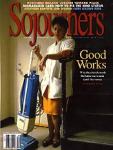Music has many functions, worship included. But one of its primary roles is its ability to move people. It’s not surprising that many of the great social movements of this century have included memorable songs—tunes with a beat and a message that drawfolks into a broader vision and a confidence to work for change.
The music of the labor movement has provided much of the dynamism for itself and other movements (see "From the Church to the Union Hall," September-October, 1996). The Smithsonian has captured on its Folkways label the power of labor songs on the 1990 CD Don’t Mourn—Organize! Songs of Labor Songwriter Joe Hill. Included on this recording are a number of songs by Joe Hill ("The White Slave" and "There is Power in a Union") and about him (Phil Och’s "Joe Hill" and "Joe Hill Listens to the Praying," by Kenneth Patchen). Paul Robeson’s powerful voice on "Joe Hill" is especially memorable, as is Utah Phillips’ "Joe Hill’s Last Will." This recording is a powerful witness to the strength of workers united, and to their resilience in the face of corporate power. As the liner notes indicate, by the end of listening to this CD, you will feel like you know Joe Hill.
Pete Seeger has long been a stalwart in the movements for the common good. (He contributed "Casey Jones—The Union Scab" to Don’t Mourn.) He has become a motivating force, as well as a symbol, to the movements, as can be experienced by listening to the recent release Where Have All the Flowers Gone: The Songs of Pete Seeger (Appleseed Recordings, 1998).
Where Have All the Flowers Gone would be a powerful compilation recording even if it was not an homage album to Seeger. With performers the likes of Bruce Springsteen, Bonnie Raitt, Ronnie Gilbert, Holly Near, Bruce Cockburn, and Ani DeFranco offering interpretations, the talent pool hits a high mark. But when reminded that one person, Seeger, penned all the tunes on this double CD project, his true genius becomes evident.
Songs included in this collection are Springsteen’s interpretation of "We Shall Overcome," Cockburn’s "Turn, Turn, Turn," and Sweet Honey in the Rock singing "Step by Step." Most hauntingly memorable is Roger McGuinn’s (of The Byrds fame) "Bells of Rhimney," which Seeger wrote about a coal miner who had appeared in a Dylan Thomas poem.
Truly, Seeger is a troubadour of our times. He has changed hearts with music to march to. His influence in the last half of the century is matched only by a handful of people.
THE "OTHER" GREAT singer-songwriter most of us think about in this regard is Woody Guthrie. His daughter, Nora, recently asked Billy Bragg to record some of Guthrie’s previously unreleased tunes. Looking for another perspective to interpret Guthrie, Bragg invited the country-oriented band Wilco to help. Together, they have released Mermaid Avenue (Elektra Entertainment Group, 1998), a remarkable opportunity to hear some "new" Woody Guthrie tunes.
This recording, with Bragg providing music to the Guthrie lyrics, broadens the listener’s experience of Guthrie. Included are love songs ("Ingrid Bergman" and "Hesitating Beauty"), songs for his children ("Hoodoo Voodoo"), and testimonies to life’s passages and evolutions ("One by One" and "Another Man’s Done Gone"). In Bragg’s hands, Guthrie becomes a living, breathing person; not just an icon to a bygone day.
My own personal favorite on this recording is "Christ for President," Guthrie’s argument that America needed(s) a leader willing to kick the moneychangers out of the temple. This song is as true now as it was when Woody was traveling and singing.
And that is truly, perhaps sadly, the truth that makes these songs so powerful. As long as we admit that "the poor will be with us always," we know there will be prophets with guitars slung over their shoulders to speak truth to power.
Thank God!

Got something to say about what you're reading? We value your feedback!